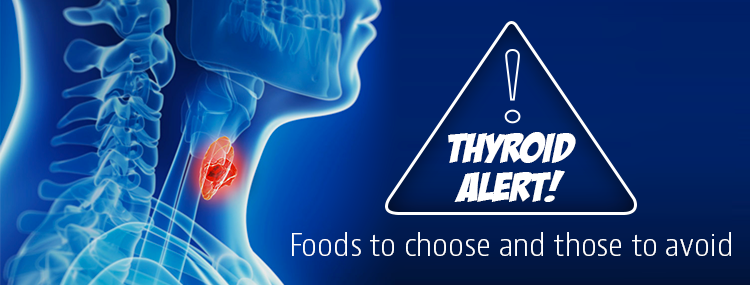
Thyroid alert! Foods to choose and those to avoid
Plagued with constant fatigue, hair loss and unexplained weight gain? The culprit could be your thyroid! Thyroid gland, situated in the neck, is the grandmaster of metabolism. It controls many activities in the body including how fast you burn calories and how fast your heart beats. Obviously when the gland malfunctions, the impact in terms of thyroid symptoms are felt almost in all organs and activities in the body, such as digestion, growth (in children), heartbeat, mood and concentration, energy levels and so on.
There are two major types of thyroid problems, one is related to deficiency of iodine – a mineral that is found in the soil near the sea or the ocean and most vegetables grown in such soil will have iodine. But in some areas, especially hilly regions where soil gets washed away in rains, there may be insufficient iodine in the crops.
The other major cause of thyroid problems could be an autoimmune condition called Hashimoto thyroiditis where iodine deficiency does not exist, but the body’s own immune system decides to attack the thyroid cells.
The thyroid hormone or TSH (thyroid stimulating hormone) that is made by another gland called the pituitary gland stimulates the thyroid gland to make a hormone called thyroxine also called “T4” hormone. The liver then converts T4 into another version of the same hormone, called “T3”, also known as triiodothyronine. The “T3” is the active form of thyroxine and regulates all the activities in the body mentioned above.
Two important substances regulate the conversion of T4 (inactive form) to T3, the active form. One of these is an amino acid that comes from protein rich foods, called tyrosine, and the other is iodine, that our table salt is fortified with.
When there is a deficiency of dietary iodine the thyroid gland will not be able to make thyroxin hormone (T3 and T4). The body tries to compensate by increasing the production of the thyroid stimulating hormone or TSH. Also, the thyroid gland increases in size to step up production of TSH, and this condition is called “goitre”.
So what is a healthy thyroid diet ?
Some naturally occurring foods are known to interfere with the ability of T4 to be converted to the active form, T3. These are known as “goitrogens”
These goitrogens are said to weaken the activity of an enzyme called thyroid peroxidase that ensures iodine is available to the thyroid hormone.
The foods most commonly in limelight as goitrogenic include cruciferous vegetables such as
• Broccoli
• Cauliflower
• Brussels sprouts
• Cabbage
• Knol khol
• Turnip
• Radish
• Mustard greens
But an important point to remember is that these are harmful to the thyroid function only in huge amounts of one kilogram or above per day! Small amounts used in every day cooking may be harmless, and indeed they should be included since cruciferous vegetables have many other health benefits, including cancer prevention.
Cooking, fermentation or soaking reduces the harmful goitrogenic substances in these foods.
Another class of compounds called flavanoids also impair thyroid functioning.
These compounds include apigenin, luteolin, kaempferol and vitexin found in soya based foods, millets such as bajra, ragi, and proso.
Soya based foods, including nuggets, soya flour and soya beans contain soy flavonoids that reduce the activity of thyroid peroxidise.
Unlike in other foods, goitrogenic activity is not reduced in soya foods or millets even when they are cooked.
However, there is no reason to ban these foods in hypothyroid population since both soya and millets are rich in fiber and low in starch. Moderate intake of these foods once or twice in a week may still be fine, while monitoring the thyroid levels under the supervision of your doctor.
All the above listed foods can still be consumed, while the vegetables can be cooked or fermented to decrease the anti thyroid activity, while the other foods including soya and millets can be consumed in moderate amounts once or twice in a week. Continue to monitor the thyroid function and do not forget your thyroid medications as prescribed. Adding iodized salt will help, and so do eating protein rich foods.
Calorie care comes with a plethora of healthy food options to suit many of your health needs, be it weight loss, or carbohydrate control. Just choose your health by logging on to www.caloriecare.com today!



